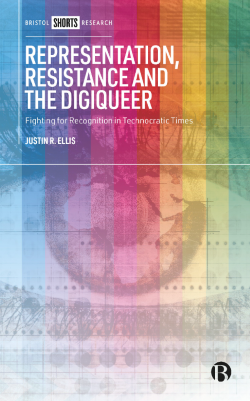Representation, Resistance and the Digiqueer
Dr Justin Ellis new book ‘Representation, Resistance and the Digiqueer - Fighting for Recognition in Technocratic Times’ is now available.
The march of technology is often framed as a boon of convenience and essential for human progress
Dr Justin Ellis’ new book draws on analysis of case law, parliamentary debates, social and mainstream media, and LGBTQ+ tech advocacy to consider the effects of networked digital organising and surveillance technologies on LGBTQ+ personal and political expression. The book will resonate with policy makers, scholars and students in criminology and related disciplines, media practitioners, and broader interested audiences. These readers may seek to understand why, despite a range of legal protections for LGBTQ+ peoples across many jurisdictions, LGBTQ+ individuals and communities continue to face challenges of renewed complexity from anti-LGBTQ+ individuals, and anti-LGBTQ+ hate groups.
These challenges include representational harms that denigrate, misrecognize, erase or omit diverse sexual orientation and gender expression. Within this context are a range of emergent technologies that will threaten and enable LGBTQ+ political and personal expression, including the proliferation of AI chat bots, synthetic media such as deep fakes, and the unregulated advance of augmented, virtual, mixed and extended reality in the metaverse. More information here.
This latest book builds on Dr Ellis’ ongoing program of research on diqiqueer criminology, including his 2021 monograph Policing Legitimacy: Social Media, Scandal and Sexual Citizenship.
Read recent Conversation Article, ‘Our hybrid media system has emboldened anti-LGBTQ+ hate – what can we do about it?’ here.
Reviews:
‘Mixing critique and hope, this timely book reminds us that fusing digital technologies and daily life cuts both ways for queer identities. LGBTQ+ people create pleasure and recognition as they navigate surveillance and harassment. Ellis offers a much-needed push to seize queerness as an unsettling practice of resistance’.
Mary L. Gray, Indiana University
‘This is a trailblazing and incisive examination of the contradictory connectivity between digital media, queer identity and justice. It is a must-read for scholars and activists interested in sexual politics and representation’.
Gail Mason, Sydney Law School
Contact
- Justin Ellis
- Email: justin.ellis@newcastle.edu.au
Related news
- Honouring a trailblazer: New lecture series celebrates Professor Bob Morgan’s legacy
- From boots to books
- Supporting Aboriginal and Torres Strait Islander students to succeed
- Tori digs up past to plan for her future
- How could Donald Trump target the LGBTQ+ community? Project 2025 is a ready blueprint for discrimination
The University of Newcastle acknowledges the traditional custodians of the lands within our footprint areas: Awabakal, Darkinjung, Biripai, Worimi, Wonnarua, and Eora Nations. We also pay respect to the wisdom of our Elders past and present.